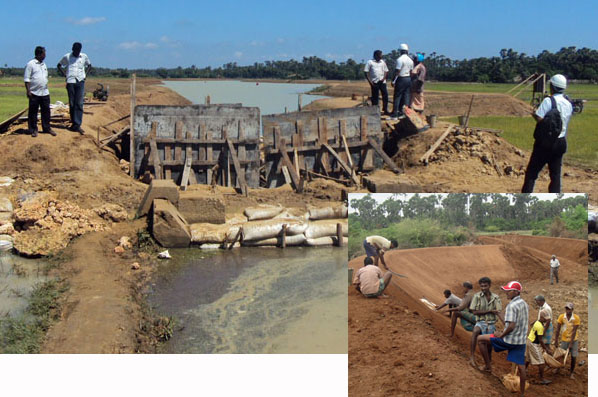JICA renovates irrigation and jetty facilities in Jaffna
November 22, 2010 07:34 pm
The Japan International Cooperation Agency (JICA) has funded the Department of Agrarian Development (DAD) to renovate seven irrigation tanks that required urgent rehabilitation in the Jaffna district.
JICA has also funded the Department of Fisheries and Aquatic Resources (DFAR) to renovate damaged fishing jetties in the district. This pilot project of renovating small-scale community infrastructure facilities in the district before the rainy season, will help to boost livelihood activities of over 2,500 farming and fishing families, including resettling communities in Chavakachcheri, Kopay, Chankanai, Thellipalai, Velanai, Sandilippay and Jaffna.
“JICA has supported the restoration of damaged infrastructure in the North since the end of the war. By doing so we hope to address significant development needs and also contribute to rebuilding the lives of people who are moved back to their home areas”, says Akira Shimura, JICA’s Chief Representative in Sri Lanka.
The irrigation tank renovation work has helped to harvest more rainwater and increase groundwater recharge, enabling farmers to use more water for irrigation purposes even after the rainy season.
The renovated fishing jetties, once completed will also enable an increased number of fishermen to use the facilities. A special feature of this project is the involvement of local communities in identifying, designing and reconstructing these facilities. Irrigation tanks and jetty facilities in the district are managed mainly by CBOs - Farmer Organizations and Fisheries Cooperative Societies.
JICA together with DAD and DFAR has facilitated CBOs to enhance their ownership and participation in operating and maintaining these facilities through community enhancement efforts including training workshops on Mine Risk Education (MRE), introducing construction management tools such as accounting books and on-the-job training programmes.
JICA will continue to support the resettlement activities in the North to restore livelihoods, to rehabilitate social and economic infrastructures and to improve abilities among the community with regard to development.












